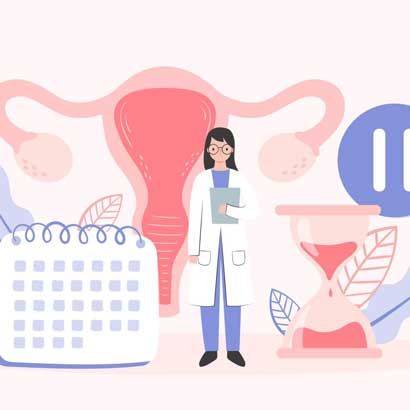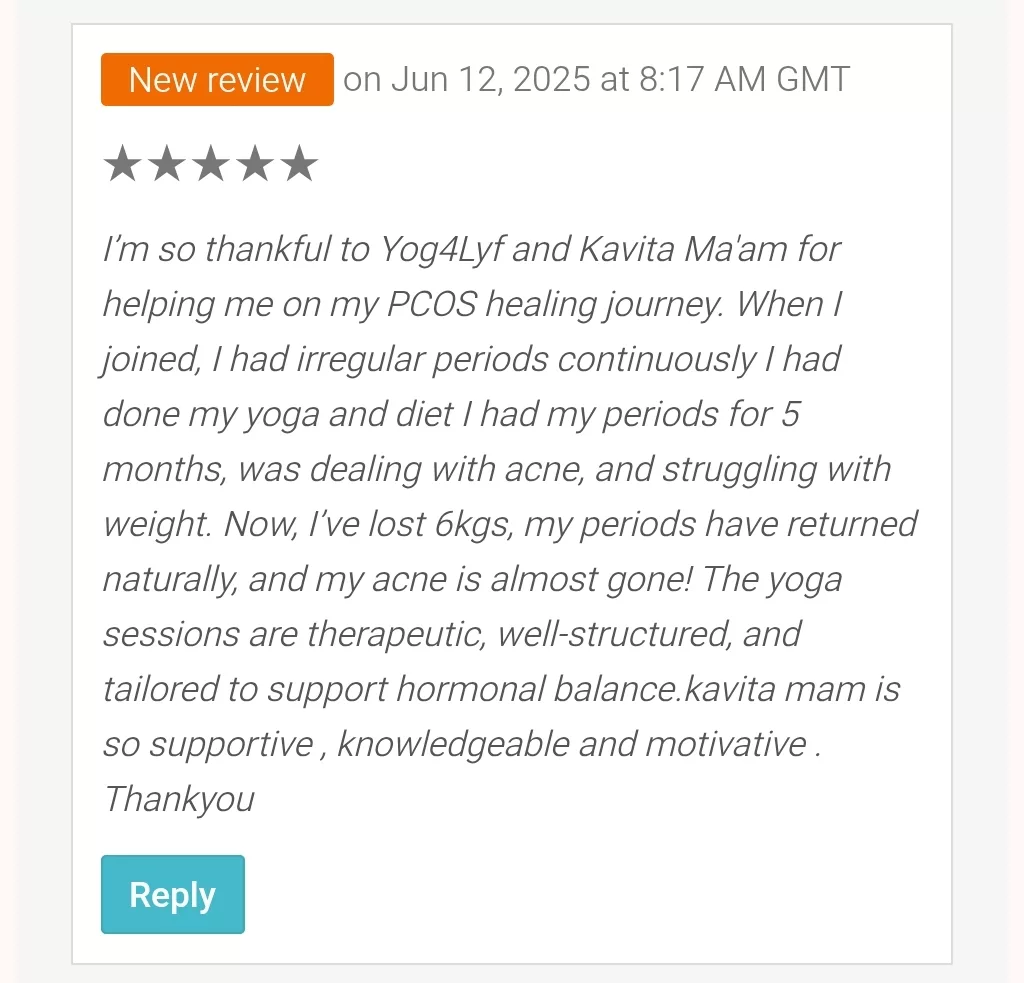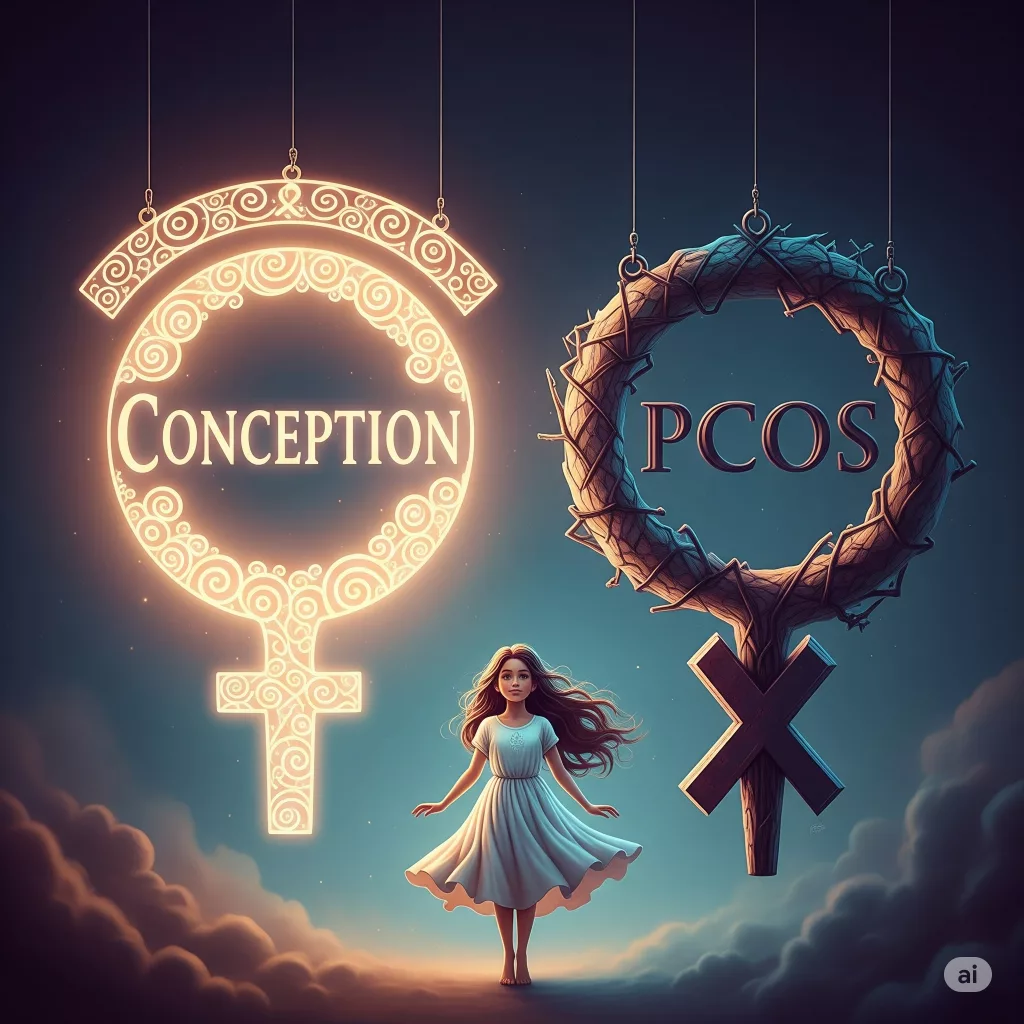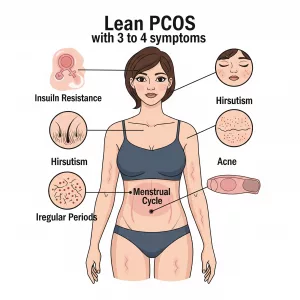
Polycystic Ovary Syndrome (PCOS) is a hormonal disorder that affects millions of women worldwide. When people think of PCOS, they often imagine someone who struggles with weight gain or obesity. However, there’s a lesser-known subtype known as Lean PCOS that can be equally challenging but harder to diagnose. Lean PCOS affects women who have a normal or even low Body Mass Index (BMI), yet experience the hormonal imbalances typical of PCOS.
Because these women don’t present with the most visible or expected symptom, weight gain, they often go undiagnosed or misdiagnosed. This lack of recognition can lead to prolonged discomfort, reproductive challenges, and emotional distress. The good news is that Lean PCOS, like other forms of the condition, can be managed and even improved through natural and medical interventions.
What is Lean PCOS?
Lean PCOS refers to women who meet the criteria for PCOS but do not fit the typical profile of being overweight or obese. These women have a BMI within the normal or even underweight range, yet they show symptoms and biochemical markers consistent with PCOS. Despite having a lean body type, their hormones are just as imbalanced as in those with the more traditional presentation of PCOS.
Lean PCOS can often go unnoticed because clinicians may overlook the possibility of PCOS when weight isn’t an issue. However, these women can still face issues like irregular menstrual cycles, excess prolactin, infertility, acne, excessive body hair, and emotional health struggles. The underlying mechanisms, insulin resistance, androgen excess, and inflammation are still very much present.
It’s essential to understand that PCOS is not just a weight-related condition. It’s a complex hormonal disorder with various presentations, and Lean PCOS is a clear example of this diversity. Awareness and accurate diagnosis are the first steps toward effective management.
Causes and Risk Factors
Hormonal Imbalance
One of the primary characteristics of PCOS, lean or otherwise, is hormonal imbalance. Women with Lean PCOS often exhibit elevated levels of androgens (male hormones), which can lead to acne, hair loss, and hirsutism. There’s also a disturbance in the luteinizing hormone (LH) and follicle-stimulating hormone (FSH) ratio, which can impair ovulation.
Insulin Resistance
Contrary to popular belief, insulin resistance is not exclusive to overweight individuals. Lean women with PCOS can also suffer from insulin resistance, where the body’s cells do not respond effectively to insulin. This can lead to elevated insulin levels, which in turn stimulate the ovaries to produce more androgens, exacerbating symptoms.
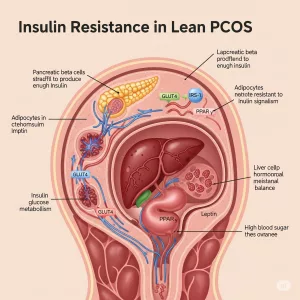
Chronic Inflammation
Many women with PCOS have chronic low-grade inflammation, which can contribute to insulin resistance and other symptoms. Inflammation markers like C-reactive protein (CRP) are often elevated in Lean PCOS as well, further supporting the need for anti-inflammatory interventions.
Genetics
PCOS often runs in families, suggesting a genetic component. If a mother or sister has PCOS, the chances of developing the condition increase, regardless of body weight.
Lifestyle and Stress
High stress levels can lead to increased cortisol production, which may worsen insulin resistance and hormonal imbalance. An unhealthy lifestyle, even without visible weight gain, can contribute significantly to the development and progression of Lean PCOS.
Symptoms and Warning Signs
Lean PCOS can manifest in various ways, and symptoms may be subtler than in classic PCOS, these symptoms may not always appear together and are less dramatic without obesity, Lean PCOS can easily be overlooked.
- Irregular or Absent Periods
- This is one of the hallmark signs. Cycles may be infrequent, unpredictable, or completely absent due to irregular ovulation.
- This is one of the hallmark signs. Cycles may be infrequent, unpredictable, or completely absent due to irregular ovulation.
- Acne and Oily Skin
- Caused by elevated androgens (male hormones), which are common in PCOS, even in lean women.
- Caused by elevated androgens (male hormones), which are common in PCOS, even in lean women.
- Hirsutism (Excess Hair Growth)
- Hirsutism (Excess facial or body hair) especially on the chin, upper lip, chest, or abdomen, due to higher levels of androgens.
- Hirsutism (Excess facial or body hair) especially on the chin, upper lip, chest, or abdomen, due to higher levels of androgens.
- Hair Thinning or Hair Loss
- Hair loss particularly along the scalp’s crown or frontal hairline.
- Hair loss particularly along the scalp’s crown or frontal hairline.
- Ovulation Difficulties or Infertility
- Irregular ovulation or anovulation (no ovulation) makes conception challenging.
- Irregular ovulation or anovulation (no ovulation) makes conception challenging.
- Polycystic Ovaries
- On ultrasound, the ovaries may appear enlarged with multiple immature follicles.
- On ultrasound, the ovaries may appear enlarged with multiple immature follicles.
- Mood Swings, Anxiety, or Depression
- Hormonal imbalances and the psychological burden of symptoms can contribute to emotional changes.
- Hormonal imbalances and the psychological burden of symptoms can contribute to emotional changes.
- Normal Weight with Abdominal Fat
- While overall BMI is normal, some women with lean PCOS may still have visceral fat around the belly area, which is linked to hormonal imbalance.
- While overall BMI is normal, some women with lean PCOS may still have visceral fat around the belly area, which is linked to hormonal imbalance.
- Mild Insulin Resistance
- Though less common than in classic PCOS, some lean women may still show signs of insulin resistance or blood sugar dysregulation
PCOS VS Lean PCOS Guide :
| Feature | PCOS (Typical) | Lean PCOS |
| Body Type | Usually overweight or obese | Normal or underweight |
| Insulin Resistance | Common and often severe | Present but usually milder |
| Visible Symptoms | More acne, hair growth, and weight gain | Acne/hair growth may be less obvious |
| Periods | Irregular or absent | Also irregular, but often less extreme |
| Fertility Issues | Common | Also common |
| Hormone Levels | High androgens (male hormones) | May have slightly elevated androgens |
| Metabolic Risk | Higher risk of diabetes, heart disease | Lower risk, but still present |
| Treatment Focus | Weight loss, insulin sensitizers | Hormonal balance, insulin control |
| Diagnosis | Easier to detect due to visible symptoms | Often missed or misdiagnosed |
| Lifestyle Impact | Weight management is key | Needs deeper hormone & diet focus |
Yoga as a Saviour in Tackling Lean PCOS
Yoga can be a powerful complementary therapy for Lean PCOS (Polycystic Ovary Syndrome) by addressing not only the physical symptoms but also the emotional and hormonal imbalances associated with the condition. While lean PCOS is often misunderstood due to the absence of excess weight, the internal dysregulation, especially hormonal imbalances, insulin resistance, and stress, remains significant. Here’s a detailed description of how yoga can benefit lean PCOS:
1. Balancing Hormones Naturally
Yoga helps regulate the endocrine system, which is responsible for hormone production. Certain yoga poses stimulate the thyroid, adrenal, and pituitary glands, helping restore balance in FSH, LH, estrogen, and androgens key hormones that are often disrupted in PCOS. Regular practice can support ovulatory cycles and menstrual regularity.
2. Reducing Stress and Cortisol Levels
Chronic stress is a hidden aggravator in lean PCOS. Elevated cortisol levels from prolonged stress can interfere with ovulation, worsen insulin sensitivity, and increase androgen levels. Pranayama (breathing techniques) and meditative yoga practices help calm the nervous system, lower cortisol, and support the hypothalamic-pituitary-ovarian axis, essential for reproductive health.
3. Improving Insulin Sensitivity
Even though lean women may appear metabolically healthy, many still have underlying insulin resistance. Yoga, particularly dynamic asanas and practices like Surya Namaskar (Sun Salutation), can improve glucose metabolism and increase insulin sensitivity, helping to reduce ovarian androgen production and improve ovulation.
4. Enhancing Blood Circulation to the Reproductive Organs
Postures such as Supta Baddha Konasana (Reclining Bound Angle Pose), Bhujangasana (Cobra Pose), and Setu Bandhasana (Bridge Pose) enhance blood flow to the ovaries and uterus. This increased circulation nourishes reproductive organs, supports follicle development, and creates a healthier uterine lining for implantation.
5. Promoting Regular Menstrual Cycles
Regular yoga practice helps reset the menstrual rhythm by harmonizing the body’s energy systems and improving hormonal feedback loops. Yoga helps stimulate the hypothalamus and pituitary, which control reproductive hormones, encouraging natural ovulation and regular cycles without the need for external hormones in some cases.
6. Supporting Emotional Health and Body Awareness
Lean PCOS can be emotionally taxing due to confusing symptoms and delayed diagnosis. Yoga promotes self-awareness, mindfulness, and emotional resilience. The combination of movement, breath, and introspection helps individuals connect with their bodies, release emotional tension, and build a positive body image.
7. Managing Digestive and Gut Health
Digestive imbalances, bloating, and inflammation are common in PCOS. Yoga poses such as Pawanmuktasana (Wind-Relieving Pose) and Twists support digestion, reduce inflammation, and enhance gut health, which in turn plays a role in hormone detoxification and insulin regulation.
8. Complementing Medical Treatment
Yoga works synergistically with medications or fertility treatments. It helps reduce side effects, improve treatment outcomes, and support overall well-being. For instance, yoga may improve the body’s responsiveness to ovulation-inducing drugs by reducing physical and emotional tension.
9. Encouraging Sustainable Lifestyle Change
Yoga encourages a holistic and consistent lifestyle, from mindful movement and clean eating to better sleep and conscious stress management. This long-term lifestyle shift is crucial for managing lean PCOS, which typically requires ongoing attention rather than quick fixes.
At Yog4Lyf We have created a Course on Lean PCOS check it out :-

Yoga for Lean PCOS
1. Supta Baddha Konasana (Reclining Bound Angle Pose)
Encourages gentle opening of the hips and pelvic region. Promotes relaxation and reduces tension in the abdominal area.
2. Viparita Karani (Legs-Up-The-Wall Pose)
Improves blood flow to the pelvic organs, helps reduce inflammation, and calms the nervous system.
3. Paschimottanasana (Seated Forward Fold)
Soothes the digestive system and brings calmness to the mind, which in turn can help regulate hormonal responses.
4. Setu Bandhasana (Bridge Pose)
Stimulates the thyroid gland, strengthens the back, and opens the chest, key for endocrine system support.
5. Apanasana (Knees-to-Chest Pose)
Gently massages the abdominal organs and helps relieve bloating and pelvic tension.
These poses can be practiced daily or several times a week, ideally combined with deep, steady breathing and rest afterward. Props such as bolsters and cushions can enhance comfort and accessibility.
Diagnosing Lean PCOS
Diagnosis typically follows the Rotterdam Criteria, which require two out of the following three:
- Irregular or absent ovulation
- Clinical or biochemical signs of hyperandrogenism
- Polycystic ovaries visible on ultrasound
For lean individuals, diagnosis often relies more heavily on blood tests and symptom tracking since physical signs may be minimal. Hormone panels usually include:
- Testosterone and DHEA-S levels
- LH and FSH ratio
- AMH (Anti-Mullerian Hormone)
- Fasting insulin and glucose levels
- Thyroid panel (to rule out other conditions)
A comprehensive diagnosis also includes ruling out other potential causes like hypothyroidism, adrenal hyperplasia, or high prolactin levels.
Natural Wellness and Lifestyle Strategies
Nutrition
Diet plays a central role in managing Lean PCOS. An anti-inflammatory, balanced diet helps regulate insulin levels and reduce symptoms.
- Whole Foods: Emphasize unprocessed, nutrient-dense foods.
- Anti-inflammatory Choices: Include leafy greens, berries, turmeric, ginger, and fatty fish.
- Reduce Sugar and Refined Carbs: Avoid high-glycemic foods that spike insulin.
- Balance Carbohydrates: Opt for complex carbs like sweet potatoes, quinoa, and legumes.
- High-Protein Meals: Help stabilize blood sugar and support lean muscle mass.
- Healthy Fats: Avocados, nuts, seeds, and olive oil help reduce inflammation.
- Gut Health: Include probiotics and fiber-rich foods to support digestion and hormone detox.
Stress Management
Chronic stress can disrupt hormonal balance and worsen symptoms.
- Mindfulness and Meditation: Regular practice helps regulate the stress response.
- Breathwork and Pranayama: Helps reduce cortisol and balance the nervous system.
- Adequate Sleep: Crucial for hormonal regulation and recovery.
- Daily Routines: Establish calming rituals like journaling, nature walks, or digital detoxes
Nutrition for Lean PCOS: Supporting Hormones Through Food
Women with lean PCOS may not need to focus on weight loss, but that doesn’t mean diet isn’t important. The goal is to manage inflammation, stabilize insulin levels, and promote hormonal equilibrium. The focus should be on nourishment, not restriction.
Dietary Guidelines:
1. Maintain Stable Blood Sugar
Lean PCOS can still involve insulin resistance. Eating every 3–4 hours, and including protein and healthy fats in each meal, helps prevent blood sugar spikes and crashes.
2. Limit Refined Carbohydrates
Avoid white bread, pastries, and sugary snacks. Choose complex carbohydrates like oats, brown rice, sweet potatoes, and lentils, which digest slowly and support energy levels.
3. Support Gut Health
The gut is closely linked to hormonal regulation. Include fiber-rich vegetables and fermented foods such as sauerkraut, yogurt (if tolerated), and kefir to support healthy gut bacteria.
4. Prioritize Omega-3 Fatty Acids
Omega-3s reduce inflammation and support reproductive health. Add foods like walnuts, flaxseeds, chia seeds, and fatty fish such as salmon to your diet regularly.
5. Minimize Inflammatory Foods
Some individuals with PCOS may be sensitive to dairy or gluten. Consider reducing these if symptoms persist. Also avoid heavily processed foods and refined oils.
6. Avoid Under-Eating
Many lean women unintentionally eat too little. Chronic undernourishment can disrupt ovulation, energy levels, and hormone production. Ensure meals are balanced and satisfying.
7. Stay Hydrated and Watch Caffeine Intake
Drink enough water throughout the day and consider limiting caffeine if it exacerbates anxiety, sleeplessness, or PMS symptoms. Herbal teas like spearmint may be helpful for reducing androgen levels.
Fertility and Lean PCOS
Many women with Lean PCOS struggle with infertility due to irregular ovulation. However, with proper treatment and support, many go on to conceive naturally or with minimal intervention.
- Ovulation Tracking: Helps determine fertile windows.
- Hormonal Support: Nutritional and medical therapies to stimulate ovulation.
- Fertility Treatments: Clomid or Letrozole may be used if natural methods don’t suffice.
- Specialist Support: Working with a fertility endocrinologist or integrative OB-GYN is beneficial.
Hormonal Imbalances Despite Normal Weight
Lean PCOS patients still experience hallmark hormonal issues such as elevated androgens (male hormones), insulin resistance, and irregular luteinizing hormone (LH) to follicle-stimulating hormone (FSH) ratios. These hormonal disturbances can impair ovulation and lead to subfertility or infertility.
Ovulatory Dysfunction
One of the primary causes of infertility in lean PCOS is anovulation (failure to ovulate regularly). Even when periods are seemingly regular, ovulation may not occur consistently, reducing chances of conception.
Insulin Resistance in Lean Individuals
Though more subtle, insulin resistance is still present in many lean PCOS patients. It contributes to increased androgen production by the ovaries, which can disrupt follicular development and ovulation, key components of fertility.
Subtle Symptoms Can Delay Diagnosis
Lean individuals may not show obvious signs like weight gain, leading to delayed diagnosis. Symptoms like acne, hirsutism (excess facial/body hair), irregular periods, or mild cystic ovaries may be overlooked or attributed to other causes, thus postponing fertility treatment.
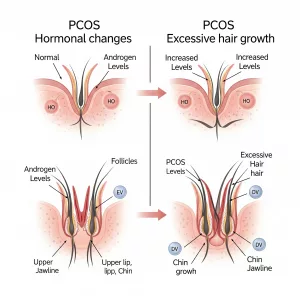
Impact on Endometrial Health
Irregular ovulation means the uterine lining (endometrium) may not develop or shed properly. This can create an inhospitable environment for implantation, even if fertilization occurs, further complicating fertility.
Treatment Considerations Are Different
Since weight loss is not applicable, treatment often focuses on ovulation induction using medications like Letrozole or Clomid. Lean PCOS patients may also respond better to lower doses of fertility medications and benefit from lifestyle interventions like stress reduction, anti-inflammatory diets, and moderate exercise.
Increased Risk of Miscarriage
Some studies suggest a slightly higher miscarriage rate in women with lean PCOS due to hormonal imbalances and poor egg quality. This makes preconception care and hormonal support during early pregnancy especially important.
Myths About Lean PCOS
“You can’t have PCOS if you’re thin”
False. PCOS can occur at any weight.
“Lean PCOS is less serious”
Wrong. Hormonal imbalances can affect fertility, skin, mental health, and metabolic health.
“No insulin resistance if you’re slim”
Inaccurate. Insulin resistance can exist in lean individuals and should be evaluated. Breaking these myths is crucial to improving diagnosis and care.
Success Story: Real-Life Case Study
A 29-year-old woman, with a BMI of 21, struggled with irregular periods, acne, and hair thinning. After years of being told everything was “normal,” she was finally diagnosed with Lean PCOS through hormonal blood work and ultrasound.
With a combination anti-inflammatory diet, strength training, and daily mindfulness, she restored her menstrual cycle in 6 months and successfully conceived a year later. Her story illustrates how lifestyle medicine, when personalized, can work wonders. Checkout another PCOS reversal success Story by one of our user – Testimonial
To all of you dealing with Lean PCOS
know that Lean PCOS may not receive the same level of attention as the more visible form of the condition, but it’s just as real and impactful. If you suspect you have PCOS despite being of average weight, don’t ignore the signs!!!
Through a combination of proper diagnosis, dietary shifts, lifestyle adjustments, and, when needed, medical support, Lean PCOS can be managed effectively. Understanding your body and working with knowledgeable healthcare professionals is the first step toward balance and wellness.
You are not alone, we at Yog4Lyf are here to make this journey smoother for you! and with the right support, healing is possible 🙂





